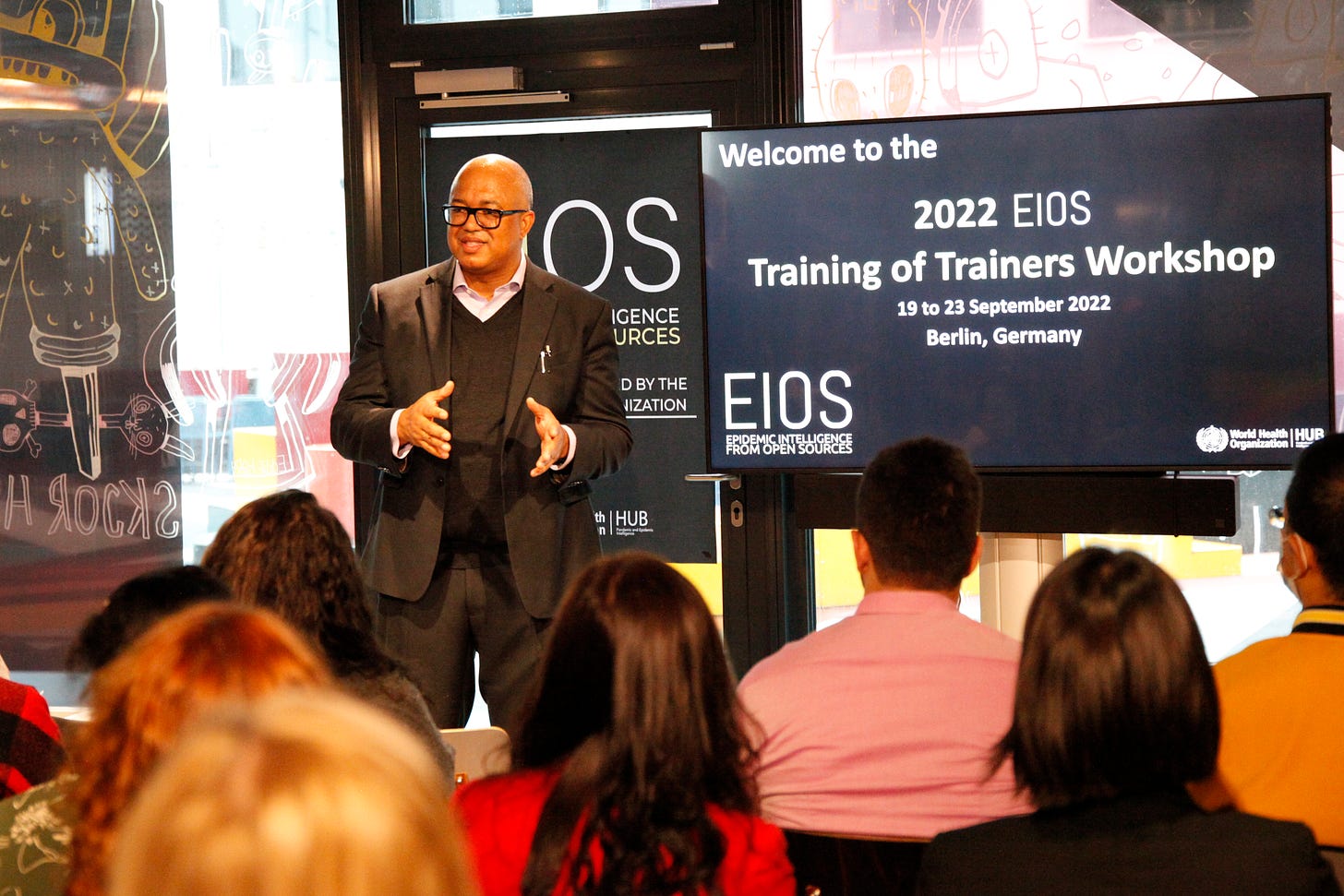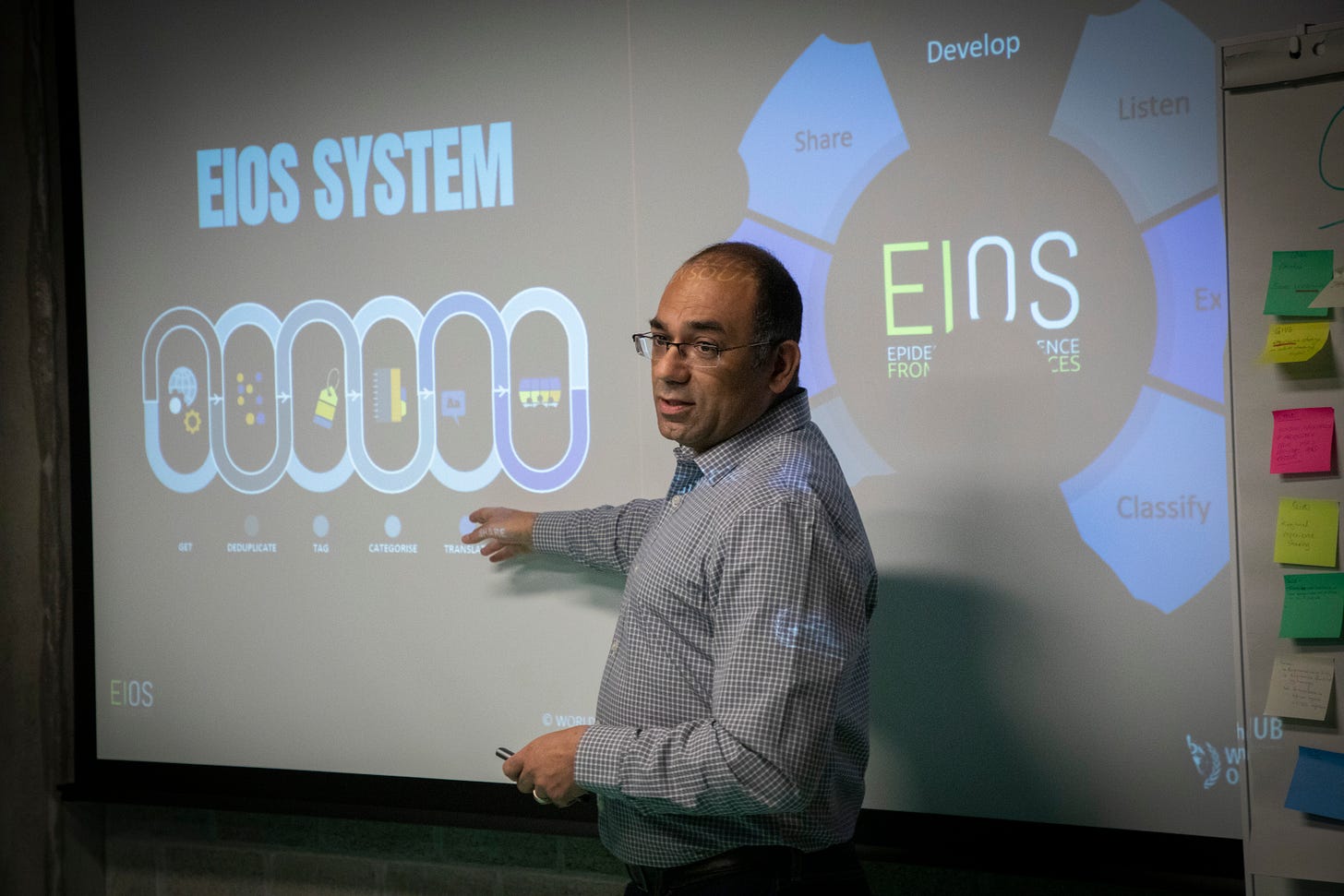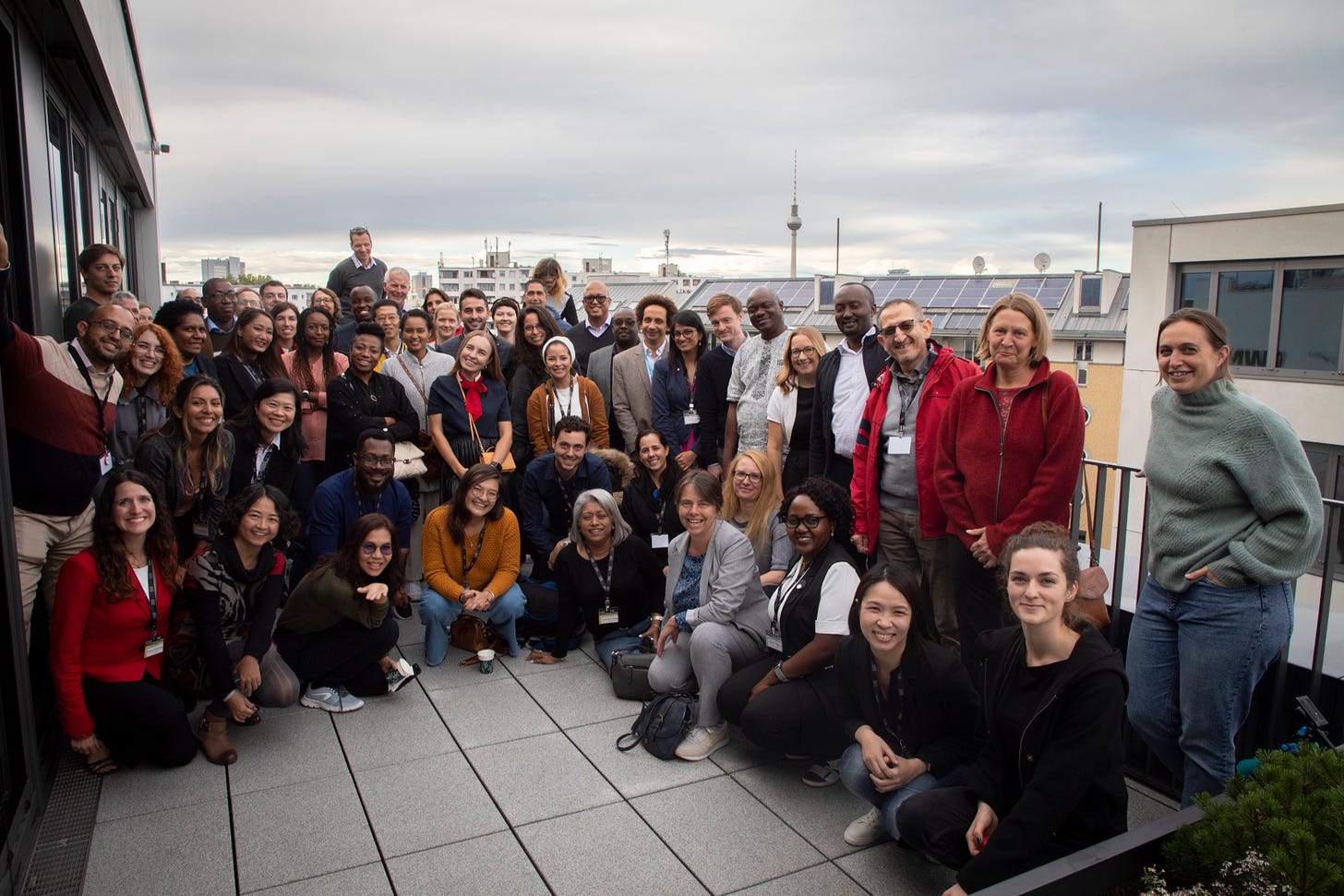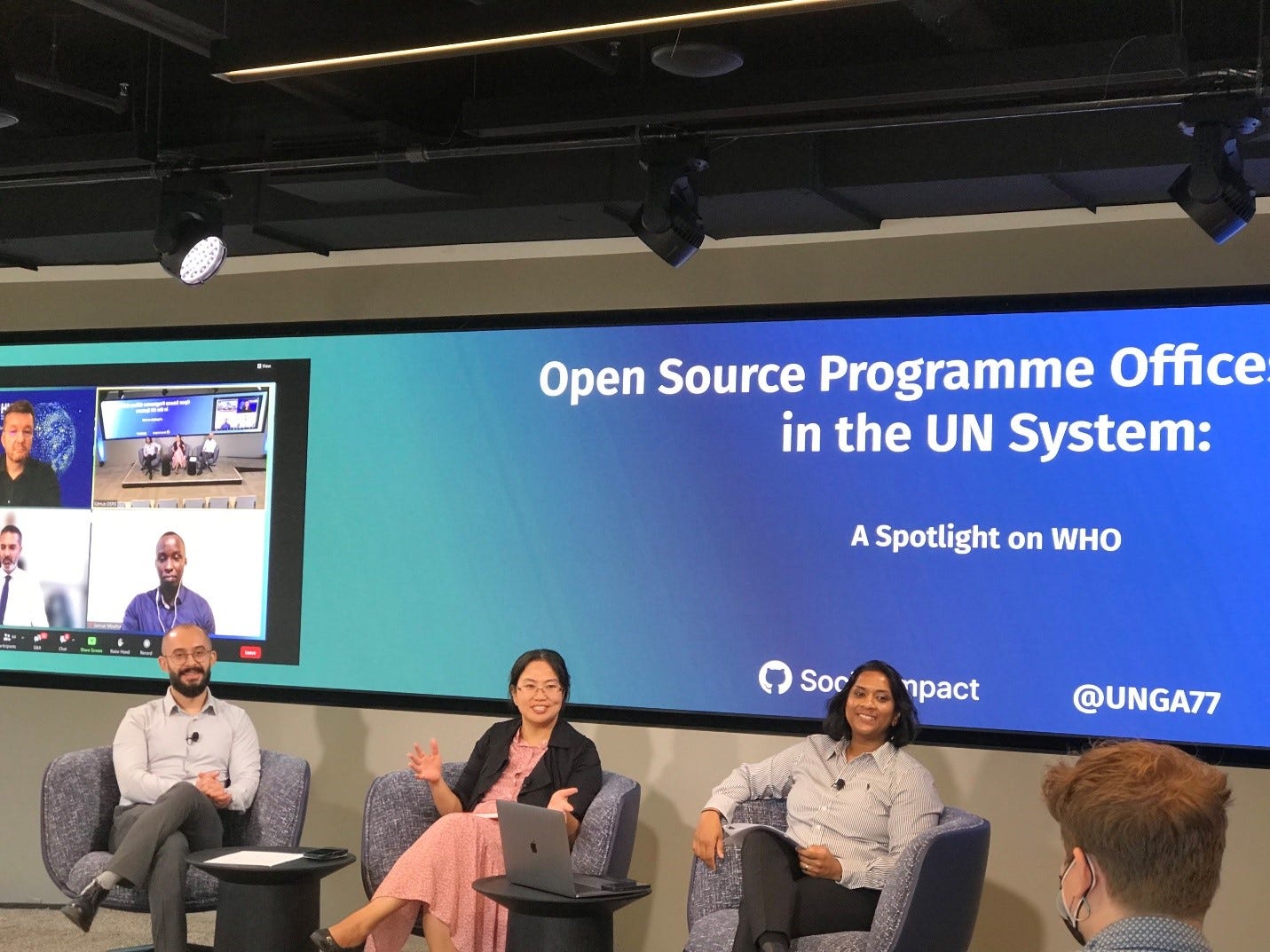Latest from the WHO Hub for Pandemic and Epidemic Intelligence
Issue 4: Summer recap and a glimpse of early autumn
The WHO Pandemic Hub has been involved in many events and projects since our last issue. Read on for highlights.
EIOS Training of Trainers workshop
EIOS is one of the flagship initiatives of the WHO Hub for Pandemic and Epidemic Intelligence. The EIOS Training of Trainers (ToT) workshop, held in Berlin 19-23 September, was the largest in-person event organized by the Hub since its inception, with more than 30 people from 20 different organizations around the world.
The workshop focused on lessons from Public Health Intelligence (PHI) experts and how they can deliver consistent, high-quality EIOS training to Member States and collaborating organizations. Participants came from all six WHO Regional Offices and Headquarters, organizational members of the EIOS Coordination Group, and Member States with extensive EIOS experience. Participants will deliver training in PHI and EIOS worldwide. This network of trainers remains key to the continued global expansion of the Hub’s mission and the EIOS initiative.
The opening and closing ceremonies were led by WHO’s Dr Chikwe Ihekweazu; Dr Phillip AbdelMalik (the Hub and EIOS Initiative) and Dr Gaya Gamhewage (Values, Nondiscrimination and Prevention of Sexual Abuse and Harassment for Trainers) also made presentations.
Alongside advanced instruction on the practical application of EIOS, participants discussed ways to use, coordinate, and implement EIOS expansion and training within their organizations. For a closer look at some session highlights and our participants in action, please watch the 2022 EIOS ToT workshop video here.
United Nations General Assembly side event
The WHO Pandemic Hub’s Open Source Programme Office (OSPO) is the first in the United Nations (UN) system and was showcased at a UN General Assembly side event in September. The OSPO is an initiative to develop guidance, frameworks, and communities of practice to support the adoption and development of open-source technologies, and to position WHO as a steward and promoter of effective open-source systems.
The OSPO team in the Hub will support stakeholders from Member States, partners, and academia, to collaboratively develop sustainable and innovative open-source solutions for pandemic and epidemic intelligence. More broadly, the OSPO will demonstrate how a structure like this in the UN system can contribute to more equitable technology and inclusive economic growth.
We have started planning to create a community of practice for people working on open-source issues to share experiences and discuss ongoing work.
The World Health Summit 2022
October was full of events and activities for the Hub, including our support of G7 meetings on pandemic preparedness (under the Presidency of Germany) and the World Health Summit (WHS), the international strategic forum for global health held annually in Berlin, this year with WHO.
The Hub was responsible for organizing and hosting two sessions at WHS (watch our keynote session on the architecture of pandemic preparedness below; all WHS sessions can be watched here):
Outsmarting Pandemics: Collaborative Surveillance and National Public Health Institutes (NPHIs) (16 October)
Dr Ihekweazu moderated a panel with Duncan Selbie, the founding Chief Executive of Public Health England, on the lessons learned and growing roles of NPHIs in collaborative surveillance. We also announced the newly signed memorandum of understanding between WHO and the International Association of National Public Health Institutes (IANPHI).
Game Changer: Architecture for Pandemic Preparedness (17 October)
Dr Ihekweazu facilitated a keynote discussion on how inclusivity, aligned prioritized approaches, strong leadership, and governance can collectively transform the pandemic preparedness architecture.
On the margins of these meetings, we met with official delegations from five Member States and five non-governmental partners. In addition to participating in the G7 health sessions, the Hub joined the German-Japanese dialogue for Global Health and the GloPID-R General Assembly (GloPID-R brings together funders investing in research on new or re-emerging infectious diseases).
Our Speaker Series
The second session of our quarterly speaker series Complexity of Pandemics, hosted in cooperation with the Charité University Hospital, took place on 22 September at the Spielfeld Digital Hub in Berlin. The goal of the series is to jointly explore the complex multidisciplinary landscape of preventing, predicting, preparing for, and responding to epidemics and pandemics.
This second session was titled Complexity of Pandemics N°2 - Exploring Insights from the Social Sciences for Collaborative Intelligence. Our moderator Professor Ilona Kickbusch led an inspiring conversation on the relevance of social sciences for epidemic and pandemic preparedness and response. The first keynote speaker, political scientist Professor Michael Bang Petersen, spoke on the concept of trust, which he described as “central to producing collective solutions to the problems we face”. Our WHO colleague, social anthropologist Doctor Julienne Ngoundoung Anoko, gave the second keynote speech. She discussed how the social sciences, including anthropology, are crucial to breaking transmission chains when biomedical interventions clash with cultural ways of perceiving and dealing with an outbreak.
Watch the recording of the second speaker series event here!

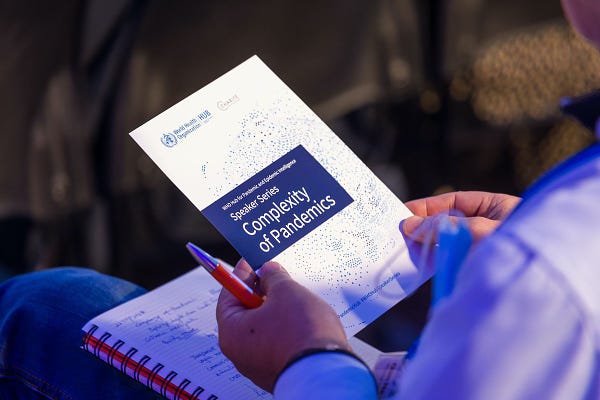
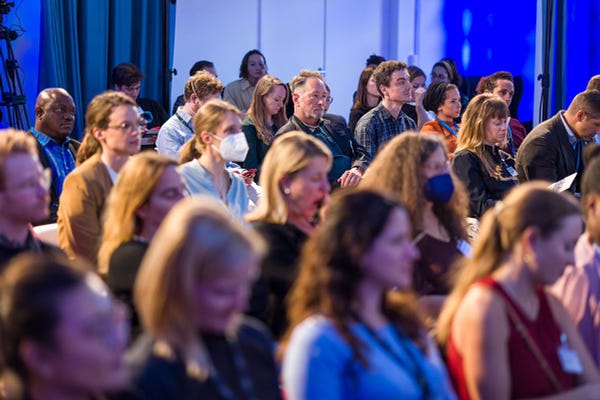
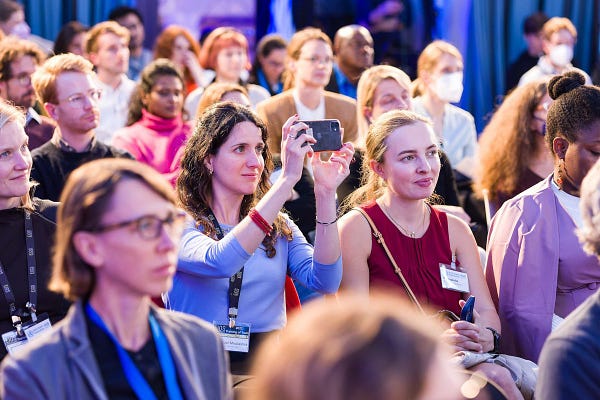
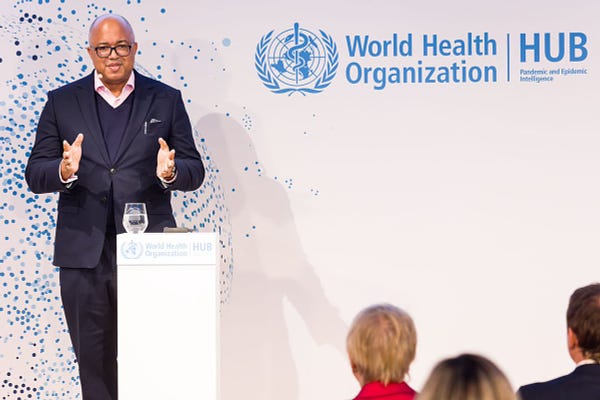
The next session of our speaker series will take place at the Global Technical Meeting 2022 of the Epidemic Intelligence from Open Sources initiative in Luxor, Egypt. In this third installment, we will explore how innovative and emerging technologies in the public health intelligence space and beyond, can be leveraged to enhance collaboration, transparency and trust for better pandemic preparedness and response. Save the date! We would be delighted for you to join us online!
COMPLEXITY of PANDEMICS N°3 – Leveraging Innovative Technologies for Enhanced Collaboration
27 November 2022, 6:00 pm to 7:30 pm (Egypt Standard Time)
Also coming up!
EIOS Global Technical Meeting (GTM)
The GTM is the EIOS initiative’s key annual event, which convenes the growing community behind EIOS to further strengthen networks, build new alliances, foster trust, and discuss topical challenges, solutions, research, and innovations in the field of public health intelligence. The 2022 EIOS GTM will take place in Luxor, Egypt, 27-29 November 2022, with about 250 public health intelligence professionals in attendance.
Under the slogan “The dawn of a new era for Public Health Intelligence,” the focus of this year’s GTM will be on the shifting public health intelligence landscape and the renewed emphasis on trust, transparency, and technology, as new actors and ways of working emerge from the COVID-19 pandemic experience.
EIOS at the Paris Peace Forum
We are extremely excited about the selection of EIOS as one of the projects to be showcased at this year’s Paris Peace Forum to be held from 11-12 November in Paris. At the Paris Peace Forum, world leaders and heads of international organizations, as well as leaders from civil society, the private sector, and thousands of individuals from around the globe, gather to share ideas and build new forms of collective action. Six priority topics have been selected; EIOS is one of the initiatives showcased within the theme “Managing the fallout of the multicrisis on populations”. Read more about EIOS in the 2022 Paris Peace Forum here.
Notes from Dr Chikwe Ihekweazu, Assistant Director-General
On 2 September we welcomed Prof Salim Abdool Karim, who has recently been appointed as advisor to the WHO Director-General (DG). In this capacity he has graciously agreed to provide us his counsel, leveraging his deep experience in South Africa and beyond. The goal of this visit was to get him acquainted with us and some of our work.
We welcomed Heyo Krömer, CEO of the Charité—one of our two founding partners—to the Hub on 2 September to take stock of our joint work to date and to explore further areas of collaboration.
On 8 October I had the privilege of giving the keynote address to about 500 German Medical Association colleagues at the World Medical Association’s General Assembly in Berlin. It was an opportunity to recognize how interconnected and interdependent the medical profession is worldwide, and to bridge some of the gaps between medical providers and the world of public health.
Professor Andrew Ullmann and Mr Johannes Wagner, the co-chairs of the German parliamentary sub-committee on Global Health, visited the Hub on 10 October. I had provided an overview of the Hub’s work and vision to the sub-committee via teleconference earlier this summer; this was the opportunity for the co-chairs to get acquainted with our space and to interact with our team. We hope to host the entire subcommitteee in early 2023.
On 11 October we welcomed Dr Thomas Steffen, State Secretary at the Federal Ministry of Health in Germany, for his first visit at the WHO Hub. We discussed our progress, current work programme, and our commitments for the future.
On 14 October we hosted the Uruguay Vice Minister of Health. We discussed possible areas of collaboration.
The Hub has been partnering with the Rockefeller Foundation since our beginning. Earlier this year the Foundation was admitted as a non-State Actor in official relations with WHO, with a key objective to strengthen the role of the WHO Hub for Pandemic and Epidemic Intelligence. This 14 October visit was the first opportunity for the Rockefeller Foundation to visit the Hub and discuss further opportunities for collaboration.
On 15 October I attended a ceremony for Virchow Prize for Global Health to honour a dear colleague and friend, Ambassador John Nkengasong, founding director of the Africa CDC, for his pioneering work and dedication to global health.
We hosted the WHO delegation to the World Health Summit for a welcome breakfast on 16 October, providing an opportunity for colleagues to connect and familiarize themselves with the Hub.
I had a wonderful conversation on 17 October with Aamer Ikram, Executive Director of the National Institutes of Health, Pakistan, on the transformation and scaling of the organization under his leadership and opportunities for future collaboration.
On 17 October we hosted the first in-person session of the Pandemic and Epidemic Intelligence Innovation Forum. Colleagues from different organizations met in Berlin and exchanged experiences and ideas. This session was part of a group of formative discussions that will help structure a global exercise led by the WHO Pandemic Hub to establish priorities for research on pandemic and epidemic intelligence.
I joined the DG and Dr Mike Ryan for a meeting with Ms Loyce Pace, US Assistant Secretary of State for Global Public Affairs on 18 October. We discussed our shared commitment to supporting the Ugandan government in its response to the Ebola outbreaks and dealing with the resurgence of cholera in Haiti.
We welcomed Dr Matshidiso Moeti, Regional Director for the WHO Regional Office for Africa, and Dr Ahmed Al-Mandhari, Regional Director for the WHO Eastern Mediterranean Region, to the Hub. We reflected on collaborative approaches where the Hub can support and engage with existing regional mechanisms to assist Member States.
We hosted Dr Ifedayo Adetifa, Director-General of the NCDC, and a delegation from his team on 19 October. The visit was an opportunity to provide an overview of the Hub’s work and to discuss opportunities for future collaboration.



